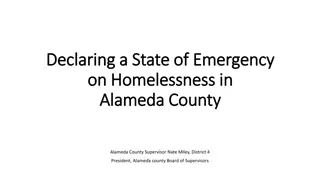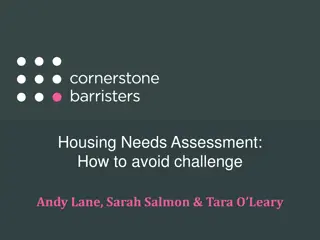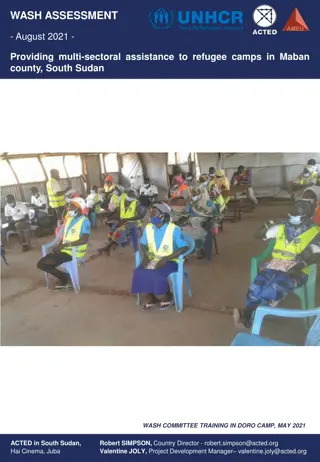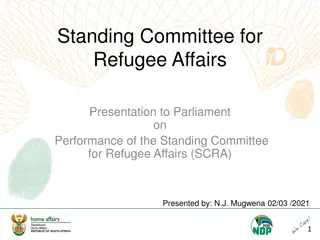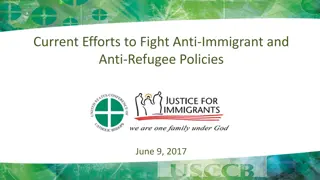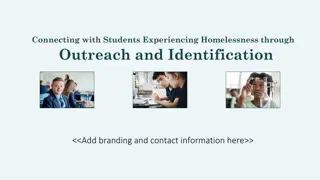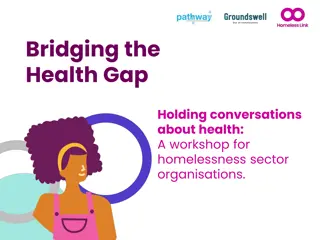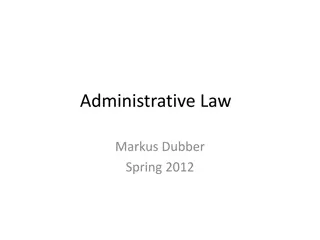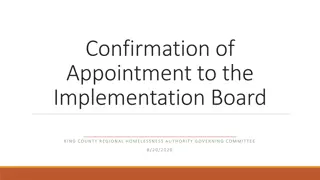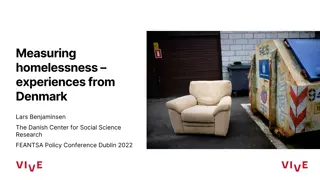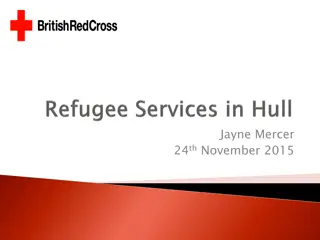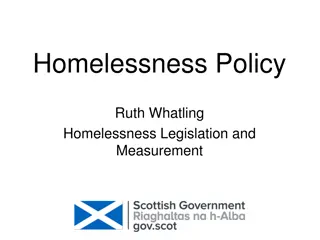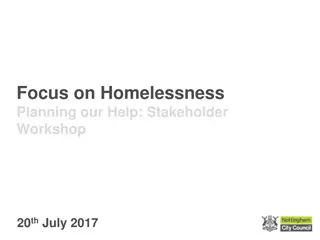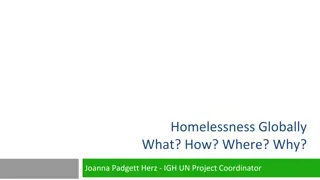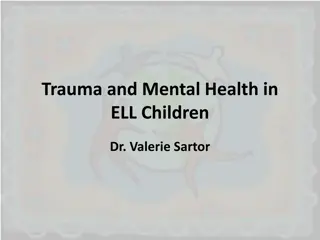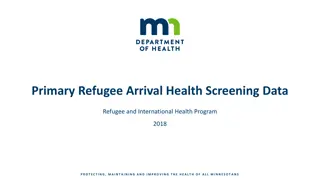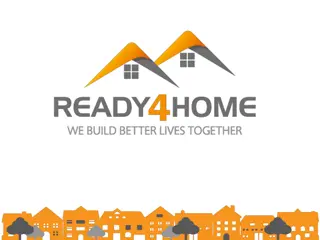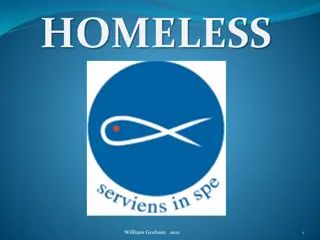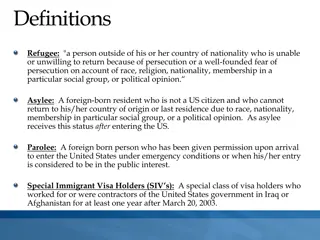Refugee Advice and Homelessness Support Services
Providing complex casework and advice support to individuals who have recently received refugee status or leave to remain, with a focus on those exiting Asylum Support accommodation. The project offers assistance to clients facing homelessness and destitution, operating on short to medium-term crisis intervention. Various types of accommodation options are available, including private rented housing, hostels, and supported housing schemes. The Homelessness Reduction Act outlines prevention and relief duties to help individuals secure accommodation and prevent homelessness.
Download Presentation

Please find below an Image/Link to download the presentation.
The content on the website is provided AS IS for your information and personal use only. It may not be sold, licensed, or shared on other websites without obtaining consent from the author.If you encounter any issues during the download, it is possible that the publisher has removed the file from their server.
You are allowed to download the files provided on this website for personal or commercial use, subject to the condition that they are used lawfully. All files are the property of their respective owners.
The content on the website is provided AS IS for your information and personal use only. It may not be sold, licensed, or shared on other websites without obtaining consent from the author.
E N D
Presentation Transcript
Making Homelessness Making Homelessness Applications Applications Rossen Roussanov Refugee Advice Project
Refugee Advice Project Refugee Advice Project Complex casework and advice support to anyone who has received refugee status/leave to remain within the past 6 months after having claimed asylum focus on those exiting Asylum Support accommodation The project focus is to provide advice and support to clients whose problems arise as a direct result of issues linked to the move-on period. The project operates on the principle of short to medium term crisis intervention. It therefore focuses on people experiencing destitution and/or homelessness. London based refugeeadvice@refugeecouncil.org.uk 0207 346 1166
Types of Accommodation Types of Accommodation Interim / Temporary accommodation Private rented Clients on a low income can apply for Housing Benefit (Local Housing Allowance) to help pay some or all of rent Need to find a property and landlord who will accept Housing Benefit Need to find a deposit and rent in advance Client needs to understand how much LHA will pay and how much they may be liable for if they begin working Private Rented Housing Housing Associations and other social schemes Local Authority Housing Hostels Different kinds of hostels: e.g. short term emergency, supported housing for those with drug/ alcohol dependencies or mental health problems, for young people, etc Referrals are generally only accepted from named homelessness agencies A local connection might be required Hostels are sometimes seen as a route into social accommodation, even though this may not be the case Supported Housing Schemes
Homelessness during move Homelessness during move- -on on HOUSING SOLUTION FOR CLIENTS STILL HOMELESS 2% FRIENDS\FAMILY 5% 86% PRIVATE RENTED 18% HOSTEL\NIGHTSHELTER 14% Refugee Advice Project clients presenting as homeless in 2017 2018 LOCAL AUTHORITY 61%
Homelessness Reduction Act Homelessness Reduction Act Homelessness prevention providing solution for at least 6 months Prevention Duty Homelessness relief helping someone to secure accommodation Relief Duty Duty to provide interim accommodation - where reason to believe an applicant may be priority need Main Duty If neither of the above steps work and the household becomes, or remains, homeless, then those in priority need retain their right to be rehoused, but non- priority households will not be entitled to further help.
HRA and homelessness applications HRA and homelessness applications New and emerging picture, new terms and new definitions Guidance encourages LA s to discharge Prevention Duty first potentially more uncertainty and less long term stability? Personalised plans - mutual agreement of steps both applicant and authority must take - language barriers? Review available on decisions must be requested within 21 days Sign up to trainings Shelter/NHAS
Approaching the HPU Approaching the HPU Traditionally a homelessness application under Part VII Housing Act 1998 now HRA duties may be engaged too The borough has a duty to carry out an assessment and a power to provide interim accommodation pending the outcome of the assessment. If the council accepts a duty, the client is put into temporary accommodation while they wait for permanent council housing to come up Gatekeeping common practice
Local Authority (Council) Housing Criteria to Apply to Homeless Persons Unit (HPU) Must have leave to remain (ILR, LLR, DLR, HP) Be homeless or threatened with homelessness within 56 days Letter from NASS terminating support valid section 21 notice Be in priority need such as: Pregnant Women Persons with dependent children Vulnerable due to old age, mental health, physical health Not be intentionally homeless Local connection: A local authority can refer case to local connection , but must continue to accommodate until decision made on referral Must have a local connection with the borough e.g. lived there for 6 out of last 12 months or 3 out of last 5 years, working there, has close family there NB s95 creates a local connection, but s4 does not A person may have more than one local connection
Priority Need Priority Need A person/family will be considered as being in priority need if they meet one of the following conditions: They have an eligible dependent child living with them They or their partner/spouse or member of their household is pregnant They have been made homeless as a result of an emergency such as fire, flood or another disaster Vulnerability categories (vulnerability is to be demonstrated in these cases): They, or one of their household members, is vulnerable as a result of old age, or because they have a mental or physical health problem They are vulnerable as a result of having been detained in prison They have left their home as a result of violence or threats of violence They are vulnerable for another special reason. (This could include former asylum seekers who have experienced torture.) They are former Looked After children who are vulnerable
Vulnerability Vulnerability The effect that being homeless would have on an applicant s vulnerability Compare to the hypothetical level of vulnerability experienced by the ordinary person when homeless Will the applicant be significantly more vulnerable than the ordinary person
Pre Pre- -empt vulnerability questions empt vulnerability questions The mental and physical health conditions, disabilities, or other issues that make the applicant vulnerable. Exactly how those characteristics, symptoms or other issues affect the applicant s health, safety and well being when they are homeless. (So if they are not homeless when they make the application they must evidence how homelessness would affect them.) What treatment or medication the applicant currently receives, or needs to receive. How being homeless would impact upon the applicant s ability to receive their treatment or take their medication. How the combined effect of the above points makes them significantly more vulnerable than an ordinary person when homeless.
Family Reunion Family joining Refugee in the UK through Family Reunion Issues Intentional homeless Benefit cap Out of area offers Pre-emptive action Early approach to the LA and early legal advice Looking for work in preferred area Preparing any disability benefit applications early
Back to HRA Back to HRA Ending prevention duty will not end affect duties owed if applicant becomes homeless Duty ends after 56 days Personal Housing Plans Assess whether a person is homeless or threatened with homelessness and eligible Face to face assessment in most cases Circumstances that caused homelessness/threat Housing needs and suitable accommodation Support that would be necessary for applicant and anybody who will be living with them to obtain and sustain suitable accommodation
Duty to refer Duty to refer The public authorities which are subject to the duty to refer are specified in the Homelessness (Review Procedure etc.) Regulations 2018. The public services included in the duty are as follows: (a) prisons; (b) youth offender institutions; (c) secure training centres; (d) secure colleges; (e) youth offending teams; (f) probation services (including community rehabilitation companies); (g) Jobcentre Plus; (h) social service authorities; (i) emergency departments; (j) urgent treatment centres; and, (k) hospitals in their function of providing inpatient care.
Getting Expert and Legal Advice Getting Expert and Legal Advice National Homelessness Advisory Service (NHAS). NHAS provide free telephone housing advice to advisers- not to applicants. Highly recommended to register - https://nhas.org.uk/ NHAS public fact sheets - https://www.nhas.org.uk/factsheets If you do not regularly provide this kind of support and you need urgent expert advice you can contact Shelter s free housing advice line on 08 08 800 4444, and check the housing rights information on their website www.shelter.org.uk



